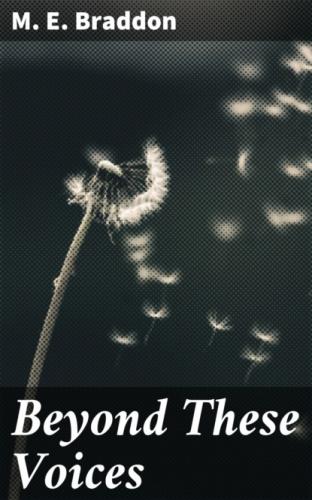M. E. Braddon
Beyond These Voices
Published by Good Press, 2021
EAN 4064066200336
Table of Contents
CHAPTER I
Lady Felicia Disbrowe was supposed to condescend when she married Captain Cunningham of the first Life—since, although his people lived on their own land, and were handsomely recorded in Burke, there was no record of them before the Conquest, nor even on the muster-roll of those who fought and died for the Angevin Kings. Captain Cunningham was handsome and fashionable, but not rich; and when he had the bad luck to get himself killed in an Egyptian campaign, he left his widow with an only daughter seven years old, her pension, and a settlement that brought her about six hundred a year, half of which came from the Disbrowes, while the other half was the rental of three or four small farms in Somersetshire. It will be seen therefore that for a person who considered herself essentially grande dame, and to whom all degrading economies must be impossible, Lady Felicia's position was not enviable.
As the seven-year-old orphan grew in grace and beauty to sweet seventeen, Lady Felicia began to consider her daughter her chief asset. So lovely a creature must command the admiration of the richest bachelors in the marriage-market. She would have her choice of opulent lovers. There would be no cruel necessity for forcing a marriage with vulgar wealth or drivelling age. She would have her adorers among the best, the fortunate, the well-bred, the young and handsome. Nor was Lady Felicia mistaken in her forecast. When Cara came out under the auspices of her aunt, Lady Okehampton, she made a success that realised her mother's fondest dreams. Youth, rank, and wealth were at her feet. There was no question of riches raked out of the gutter. She had but to say the sweet little monosyllable "yes," and one of the best born and best-looking men in London, and town and country houses, yacht and opera box, would be hers; and her mother would cease to be "poor Lady Felicia."
Unhappily, before Lord Walford had time to offer her all these advantages, Cara had fallen in love with somebody else, and that somebody was no other than Lancelot Davis, the poet, just then the petted darling of dowagers, and of young married women whose daughters were in the nursery, and who had therefore no fear of his fascinating personality. Unfortunately for Lady Felicia, her head was too high in the air for her to take note of the literary stars who shone at luncheon parties, and even when her daughter praised the young poet, and tried to interest her mother in his latest book, Lady Felicia took no alarm. It was only in the beginning of their acquaintance that Cara talked of the poet to her unresponsive mother. By the time she had known him twenty days of that heavenly June, he was far too sacred to be talked about to an unsympathetic listener. It was only to her dearest and only bosom friend, who was also in love with the adorable Lancelot, that Cara liked to talk of him, and to her she discoursed romantic nonsense that would have covered reams of foolscap, had it been written.
"Lancelot!" she said in low, thrilling tones. "Even his name is a poem."
Everything about him was a poem for Cara. His boots, his tie, his cane, and especially his hair, which he took a poet's privilege of wearing longer than fashion justified.
Though educated at the Stationers' School, and unacquainted with either 'Varsity, nobody ever
